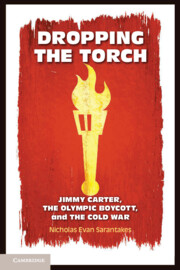Book contents
- Frontmatter
- Contents
- Acknowledgments
- Abbreviations
- Introduction Miracle on Ice
- Chapter 1 Lord Killanin and the Politics of the Olympics
- Chapter 2 Los Angeles versus Moscow
- Chapter 3 Jimmy Carter and U.S.-Soviet Relations
- Chapter 4 The Soviet Invasion of Afghanistan
- Chapter 5 The American Response
- Chapter 6 Easy Victories
- Chapter 7 Painful Losses
- Chapter 8 The White House Games
- Chapter 9 Coca-Cola, NBC, and the Defeat of the Iron Lady
- Chapter 10 The Vote in Colorado
- Chapter 11 Civil Wars
- Chapter 12 Carter versus Killanin
- Chapter 13 Moscow: The Olympics Are the Olympics
- Chapter 14 Los Angeles
- Chapter 15 Conclusion
- Epilogue
- Notes
- Bibliography
- Index
Chapter 1 - Lord Killanin and the Politics of the Olympics
Published online by Cambridge University Press: 05 September 2012
- Frontmatter
- Contents
- Acknowledgments
- Abbreviations
- Introduction Miracle on Ice
- Chapter 1 Lord Killanin and the Politics of the Olympics
- Chapter 2 Los Angeles versus Moscow
- Chapter 3 Jimmy Carter and U.S.-Soviet Relations
- Chapter 4 The Soviet Invasion of Afghanistan
- Chapter 5 The American Response
- Chapter 6 Easy Victories
- Chapter 7 Painful Losses
- Chapter 8 The White House Games
- Chapter 9 Coca-Cola, NBC, and the Defeat of the Iron Lady
- Chapter 10 The Vote in Colorado
- Chapter 11 Civil Wars
- Chapter 12 Carter versus Killanin
- Chapter 13 Moscow: The Olympics Are the Olympics
- Chapter 14 Los Angeles
- Chapter 15 Conclusion
- Epilogue
- Notes
- Bibliography
- Index
Summary
Anyone at all familiar with the modern Olympics and its history knows that it has never been free of international politics. Although the political issues that dominate world affairs have had their influence, the movement also has its own set of issues that are often quite different. While it is true that the Olympics fuel nationalism, the Games direct those energies into nonlethal forums and, as a result, encourage mutual understanding. This background was a significant factor in the boycott effort of 1980, and the president of the IOC more than anyone else understood this context. The presence of politics might seem to contradict the Olympic ideal of bringing the people of the world together, but not really.
The very heart of the international Olympic movement is the IOC. Baron Pierre de Frédy de Coubertin of France created the organization in 1894 when he “revived” the Olympics. He picked the founding members, and it has been a self-selecting organization ever since. Lord Killanin described it as basically a “club.” The Olympic Charter is the constitution of the movement, which the Committee can interpret as it sees it. There are many examples of the committee ignoring both the spirit and letter of the document when it so chooses. The IOC essentially answers only to itself, and for a long time having a seat on the committee was a lifetime appointment. There is no rule that the IOC must have a delegate from every country associated with the movement. As a result, several members can be, and often are, from the same nation, while most other lands have no voice at all in this organization. Members of the IOC like to note that they are not envoys of their homelands, but rather representatives of the Olympic movement, ambassadors if you will, in the places where they reside.
- Type
- Chapter
- Information
- Dropping the TorchJimmy Carter, the Olympic Boycott, and the Cold War, pp. 15 - 31Publisher: Cambridge University PressPrint publication year: 2010



